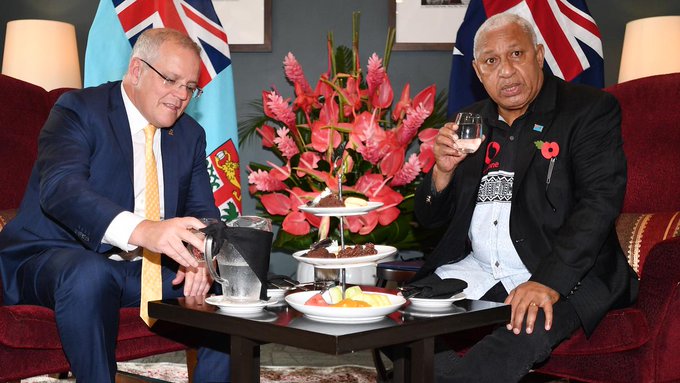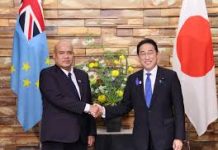By Wesly Morgan
The first national leader to congratulate Joe Biden on his election as U.S President was Fiji’s Prime Minister, Frank Bainimarama. There was little doubt what he wanted from the new head of the world’s most powerful nation.
“Together, we have a planet to save from a climate emergency,” he tweeted. Bainimarama knew Pacific island countries had gained a powerful ally in the fight to tackle climate change. Not only would Biden return the US to the Paris Agreement; he would also, as his administration’s list of “immediate priorities” promised, pressure countries “to ramp up the ambition of their climate targets”. Bainimarama quickly followed up with a formal letter inviting Biden to attend the 2021 Pacific Islands Forum.
This audacious diplomacy from Fiji fits with a recent pattern from Australia’s island neighbours – the 14 independent nations of the Pacific Islands Forum – who have become adept at working with major powers to shape global diplomacy on climate change. In 2015, for example, Pacific diplomats were instrumental in securing the Paris Agreement, though their role in the negotiations was not widely appreciated in Canberra. Now, Pacific countries are working with some of Australia’s closest allies and partners – including the US and Britain – to press countries to commit to more ambitious Paris targets before the UN Climate Change Conference (COP26) in Glasgow in November.
For Australia, engagement with Pacific island countries is driven, above all, by a strategic imperative to maintain political influence and to deny the islands to other powers. In the context of the US alliance, Pacific island states are understood as part of Australia’s sphere of influence. Security relations are shaped by the ANZUS Treaty, but also by an ancillary Australia-US naval agreement that deems Australia responsible for maritime security in the southwest Pacific.
This results in a curious state of affairs: Australia views itself as a regional leader, yet its identity as a Pacific nation remains uncertain. To compound matters, Australia’s attention span is short, and engagement with the Pacific tends to be episodic, driven by periodic crises that are understood to require Australian intervention, such as the civil war in Bougainville in the 1990s, or coups in Fiji and unrest in the Solomon Islands in the early 2000s. Between these crises, Canberra tends to forget the Pacific again.
It can be easy to forget, but before the Covid-19 pandemic, Prime Minister Scott Morrison’s signature foreign policy was the “Pacific Step-up” – an initiative intended to cement Australia’s position as a security partner of choice for Pacific states. But Morrison is learning the hard way that the step-up will not succeed until Australia does more to tackle the issue that Pacific island leaders see as their main security threat: climate change.
In the six years since the Paris conference, geostrategic competition between the US and China has prompted major powers to take a renewed interest in Pacific island states. China, through its Belt and Road Initiative, has financed important infrastructure projects in the region, including wharves, airports and roads. The US has responded with hundreds of millions of dollars in aid as part of a 2019 “Pacific Pledge”.
Japan too has committed new funds for infrastructure, while New Zealand bumped up aid as part of a 2018 “Pacific Reset”. Britain has dived back into the region with a 2019 “Pacific Uplift” that includes three new diplomatic posts in the Pacific. French President Emmanuel Macron visited Australia and New Caledonia in 2018 to remind everyone that France was a “Pacific power” with a keen interest in making sure China does not dominate the region. Even Indonesia announced a “Pacific Elevation” in 2019. Amid these pledges, resets, elevations and uplifts, Australia’s Pacific Step-up is in a crowded field.
Unlike Australia, however, other countries have leveraged climate policy to win friends in the region. They have highlighted steps they are taking to reduce emissions and have promoted Pacific leadership on climate. France, for example, has recast its Pacific image from a colonial power that tests nuclear bombs to a key partner in the climate fight.
As other powers have exercised climate diplomacy they have, perhaps inadvertently, highlighted Australia’s lack of climate action. In 2018, New Zealand legislated a net-zero emissions target for 2050, which in the eyes of Pacific leaders set Wellington apart from Canberra. At the 2019 Pacific Islands Forum leaders’ retreat, while Morrison argued over the text of a regional climate declaration, Bainimarama took a lunchtime walk with Jacinda Ardern. He live-tweeted a picture of the two strolling the Funafuti foreshore, captioning it, “When combating climate change, it’s good to have an ally like New Zealand in your corner. Together, we can save Tuvalu, the Pacific, and the world. Vinaka vakalevu [thank you so much] for the passion you bring to this fight, @jacindaardern”.
Ardern told reporters that “Australia has to answer to the Pacific” on climate change. The contrast between other countries and Australia is especially pronounced this year, as major powers the US, the European Union and Britain work with Pacific island countries to press for stronger targets before the COP26 summit.
While Pacific countries understand the climate crisis as an urgent threat to their security, Australia does not yet see it in the same way. This has led to a mismatch in strategic priorities.
Australia’s Pacific Step-up is driven by security concerns, particularly that China could leverage infrastructure lending to establish a military base in the Pacific. But island leaders take a different view. At the 2018 Pacific Islands Forum, they issued a declaration formally reaffirming climate change as the “single greatest threat to the livelihoods, security and wellbeing of the peoples of the Pacific”.Unlike Australia, however, other countries have leveraged climate policy to win friends in the region. They have highlighted steps they are taking to reduce emissions and have promoted Pacific leadership on climate. France, for example, has recast its Pacific image from a colonial power that tests nuclear bombs to a key partner in the climate fight.
As other powers have exercised climate diplomacy they have, perhaps inadvertently, highlighted Australia’s lack of climate action. In 2018, New Zealand legislated a net-zero emissions target for 2050, which in the eyes of Pacific leaders set Wellington apart from Canberra. At the 2019 Pacific Islands Forum leaders’ retreat, while Morrison argued over the text of a regional climate declaration, Bainimarama took a lunchtime walk with Jacinda Ardern. He live-tweeted a picture of the two strolling the Funafuti foreshore, captioning it, “When combating climate change, it’s good to have an ally like New Zealand in your corner. Together, we can save Tuvalu, the Pacific, and the world. Vinaka vakalevu [thank you so much] for the passion you bring to this fight, @jacindaardern”.
Ardern told reporters that “Australia has to answer to the Pacific” on climate change. The contrast between other countries and Australia is especially pronounced this year, as major powers the US, the European Union and Britain work with Pacific island countries to press for stronger targets before the COP26 summit.
While Pacific countries understand the climate crisis as an urgent threat to their security, Australia does not yet see it in the same way. This has led to a mismatch in strategic priorities.
Australia’s Pacific Step-up is driven by security concerns, particularly that China could leverage infrastructure lending to establish a military base in the Pacific. But island leaders take a different view. At the 2018 Pacific Islands Forum, they issued a declaration formally reaffirming climate change as the “single greatest threat to the livelihoods, security and wellbeing of the peoples of the Pacific”.
Compared with a more coercive China, and competition between the US and China, island leaders see the impacts of climate change – stronger cyclones, devastating floods, rising seas, dying reefs and ocean acidification – as more tangible and immediate threats. As Fiji’s military commander, Rear Admiral Viliame Naupoto, told the 2019 Shangri-La Security Dialogue in Singapore: “I believe there are three major powers in competition in our region. There is the US … there is China [and] the third competitor is climate change. Of the three, climate change is winning, and climate change exerts the most influence on countries in our part of the world. If there is any competition, it is with climate change.”
Increasingly, the rest of the world shares the Pacific’s perception. Australia is out of step not only with Pacific island states, but also with major powers and friends.
A new Australian climate policy would allow a reset of Australia’s Pacific strategy. Morrison himself understands how important climate action is for Australia’s relationships in the region. Soon after he became Prime Minister, he was asked by Alan Jones why we shouldn’t just “rip up” the Paris Agreement and bow out of it. His response was telling. He told Jones the agreement was “enormously important” to Australia’s island neighbours, “who are strategic partners in the Pacific”. He was right, of course. Good relationships with Pacific island countries are vitally important for Australian security.
If Australia begins to shift its approach to climate change, it will have a chance to work with Pacific countries as climate partners. The first order of business will be to announce a target of net-zero emissions by 2050. Doing so at this year’s Pacific Islands Forum would tell the world Australia is committed to action and working with Pacific island countries to achieve it.
Wesley Morgan is a Griffith Asia Institute Fellow and this is an edited extract of his essay Ripple Effect in the current issue of Australian Foreign Affairs, Feeling the Heat, published this week. Compared with a more coercive China, and competition between the US and China, island leaders see the impacts of climate change – stronger cyclones, devastating floods, rising seas, dying reefs and ocean acidification – as more tangible and immediate threats. As Fiji’s military commander, Rear Admiral Viliame Naupoto, told the 2019 Shangri-La Security Dialogue in Singapore: “I believe there are three major powers in competition in our region. There is the US … there is China [and] the third competitor is climate change. Of the three, climate change is winning, and climate change exerts the most influence on countries in our part of the world. If there is any competition, it is with climate change.”
Increasingly, the rest of the world shares the Pacific’s perception. Australia is out of step not only with Pacific island states, but also with major powers and friends.
A new Australian climate policy would allow a reset of Australia’s Pacific strategy. Morrison himself understands how important climate action is for Australia’s relationships in the region. Soon after he became Prime Minister, he was asked by Alan Jones why we shouldn’t just “rip up” the Paris Agreement and bow out of it. His response was telling. He told Jones the agreement was “enormously important” to Australia’s island neighbours, “who are strategic partners in the Pacific”. He was right, of course. Good relationships with Pacific island countries are vitally important for Australian security.
If Australia begins to shift its approach to climate change, it will have a chance to work with Pacific countries as climate partners. The first order of business will be to announce a target of net-zero emissions by 2050. Doing so at this year’s Pacific Islands Forum would tell the world Australia is committed to action and working with Pacific island countries to achieve it.
Wesley Morgan is a Griffith Asia Institute Fellow and this is an edited extract of his essay Ripple Effect in the current issue of Australian Foreign Affairs, Feeling the Heat, published last week.
SOURCE: THE AUSTRALIA/PACNEWS


















